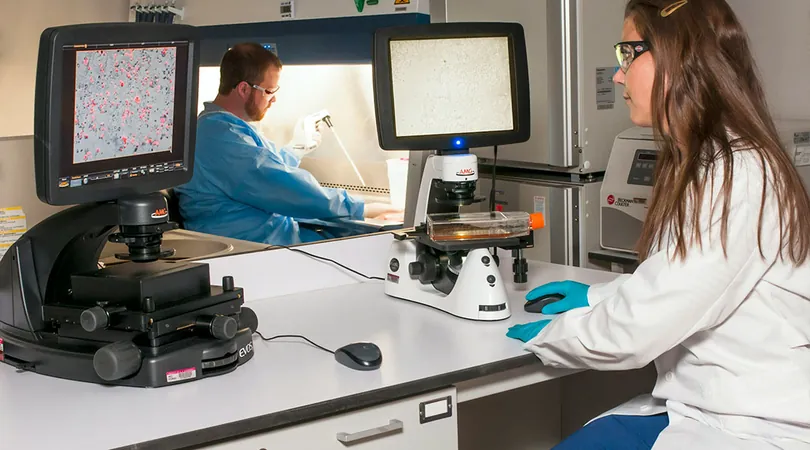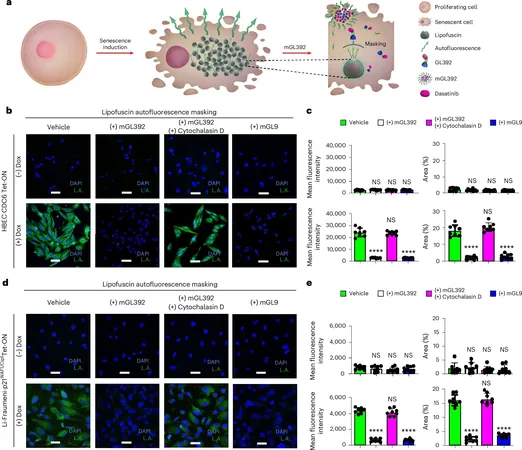
Revolutionary Nanocarrier Cancer Vaccine Shows Promise in Boosting Immunity Against Melanoma!
2025-03-20
Author: Ming
Introduction
Researchers have unveiled an innovative vaccine designed specifically for the treatment of late-stage metastatic melanoma, one of the most aggressive forms of skin cancer that poses significant challenges to traditional therapies. Melanoma often eludes conventional treatments because it develops in a tumor microenvironment that actively suppresses the body’s immune response, rendering these treatments ineffective.
Immunosuppressive Environment
This immunosuppressive environment presents a central hurdle to effective cancer therapy, leading to not only resistance to treatments but also the frightening possibility of tumor relapse, where cancer re-emerges after periods of apparent control. Alarmingly, melanoma is the most prevalent fatal skin cancer, with projections from the American Cancer Society suggesting that over 104,960 new cases will be diagnosed in the U.S. alone in 2025—resulting in an estimated 8,430 deaths.
Tumor-Associated Antigen-Based Cancer Vaccines
In response to this urgent need, scientists have been exploring tumor-associated antigen-based cancer vaccines. These vaccines leverage antigens expressed by tumors to incite a robust immune response. By activating antigen-presenting cells, they encourage the growth of killer T cells—key players in the immune system's strike against cancer. Such vaccines are vital for patients who don’t respond favorably to existing immune checkpoint inhibitors or adoptive T-cell therapies.
Limitations of Current Vaccines
However, there are limitations to current tumor-associated antigen vaccines. The new study, detailed in the journal *Advanced Materials*, introduces an exciting development: a multivalent nanoconjugate vaccine intended to address these shortcomings.
Enhancing Antigen Stability and Delivery
“The primary challenge with existing vaccines is the swift breakdown of tumor-associated antigens by serum proteases and their insufficient delivery to lymphoid organs, which limits immune cell uptake and subsequent activation,” explained Helena F. Florindo, a leading scientist from the Research Institute for Medicines. “Our new vaccine enhances the stability of these antigens, promotes their transport to lymph nodes, and optimizes dendritic cell engagement, ultimately reducing the expression of the PD-L1 immune checkpoint—a protein that can inhibit immune response.”
Innovative Nanocarrier Development
The research was spearheaded by a team that created a star-shaped nanocarrier drug platform made from biodegradable polyglutamate and conjugated with melanoma-specific peptide antigens, designed to push the immune system into action more effectively.
Initial Findings
“This innovative nanoconjugate directly targets lymph nodes, improving the presentation of the antigens and eliciting a stronger immune response,” said co-author María J. Vicent from the Prince Felipe Research Center. “Initial findings indicate that the vaccine can trigger powerful immune-mediated responses that not only enhance overall survival but also work synergistically when paired with PD-1 inhibitors, helping to counteract immunosuppression.”
Preclinical Success and Future Directions
While the vaccine has only been tested in mice, it shows significant promise. In murine melanoma models, the results were optimistic: the treatment not only successfully decreased tumor growth but also improved survival rates. The vaccine is currently in preclinical stages, but its effectiveness has been validated in humanized mouse models that closely replicate human immune responses.
Unexpected Discoveries
One unexpected yet potentially game-changing discovery from the study was that the vaccine appeared to modify the tumor immune environment, enhancing T-cell activation and reducing PD-L1 expression, even prior to the introduction of immune checkpoint inhibitors.
Next Steps
Moving forward, researchers are planning crucial preclinical toxicology studies and early-phase clinical trials to better gauge the vaccine’s safety and efficacy in humans. Progress is contingent on developing scalable production techniques and navigating regulatory pathways.
Conclusion
While no human clinical trials have commenced yet, experts like Florindo remain hopeful. "We’re excited about the potential of this technology," she stated. "There’s still a journey ahead before it becomes available to patients, but each step brings us closer to a transformative option for those affected by melanoma.”




 Brasil (PT)
Brasil (PT)
 Canada (EN)
Canada (EN)
 Chile (ES)
Chile (ES)
 Česko (CS)
Česko (CS)
 대한민국 (KO)
대한민국 (KO)
 España (ES)
España (ES)
 France (FR)
France (FR)
 Hong Kong (EN)
Hong Kong (EN)
 Italia (IT)
Italia (IT)
 日本 (JA)
日本 (JA)
 Magyarország (HU)
Magyarország (HU)
 Norge (NO)
Norge (NO)
 Polska (PL)
Polska (PL)
 Schweiz (DE)
Schweiz (DE)
 Singapore (EN)
Singapore (EN)
 Sverige (SV)
Sverige (SV)
 Suomi (FI)
Suomi (FI)
 Türkiye (TR)
Türkiye (TR)
 الإمارات العربية المتحدة (AR)
الإمارات العربية المتحدة (AR)